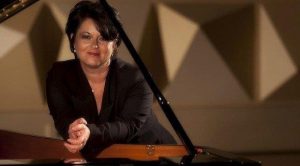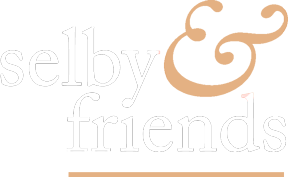JUST ‘C’
Selby & Friends Deakin Edge, Federation Square Wednesday April 13
Clive O’Connell

She’s fortunate in her friends, Kathryn Selby. I know that she has collaborated in past seasons with violinist Susie Park and cellist Clancy Newman, both musicians with Australian connections if US-based; clearly, their styles and personalities resonate with the pianist and this latest series recital showed an ideal professional fusion in play throughout trios by Copland, Mendelssohn, Shostakovich and Brahms. All three major works were in the key of C, but then, with two of the composers, you’re as often in the key as out of it, if not more so in the case of the Russian master.
The executants tweaked the order of play, opening with Shostakovich – not the very familiar E minor work so popular at chamber music competitions where young tyros learn in real time how dangerous this open-faced score can be, but a piece of juvenilia from the composer’s late teens. A one-movement construct, the trio owes obvious debts to late Romantic influences, the shade of Rachmaninov looming large in the active piano part during the central fast section, but simultaneously displaying the young composer’s spiky, nervous traits and a determined taste for percussive dissonances. Distinguishing this reading was the immaculate dovetailing of lines at nodal points, and Newman’s remarkable colour. I have little liking for comparisons between instruments and voices but for once it can be justified. This young player’s cello has a distinctly vocal character which may spring from an ability to phrase his line as an informed singer does, or it could spring from the nature of his instrument which can provide a real tenor voice, not a consistently applied bull-roar rumble.
Next came Brahms No. 2: not as often performed as its predecessor but much better known than the composer’s last C minor composition in this form. Here, both strings gave an object lesson in partnership, both in the unison statements of the opening, in details like the strong triple-string pizzicati later on, and in the sheer excitement of the first movement’s post-Animato concluding pages. To this, you could add the control demonstrated in the final variation of the second movement, the antiphonal interplay carefully effected against Selby’s arpeggio-rich decorative support.
Everybody aimed to make the Scherzo‘s opening as sotto voce as possible but the result was a lack of definition – a series of whispers that eventually resolved into metrical clarity only at about bar 11. The Trio found an infectious swing in the score, Selby bringing a fine complex into play as she pitched her 3/4 melodic balance against the movement’s underpinning 6/8 rhythm. The finale made a powerful statement, Park a vivid presence from the start with a searingly penetrating line most evident on the work’s final page where she and Newman put up a telling resistance to Selby’s massive fortissimo chord work.
A curiosity even among what is a notably heterogeneous body of work, Copland’s Vitebsk – Study on a Jewish Theme here enjoyed a crackling airing, both strings’ shofar imitating boldly accomplished, to the point that I (probably alone in this audience, judging by the discomfort of some neighbouring patrons) felt disappointed when the musical text moved into more orthodox paths for its examination of the Jewish melody. Clancy’s enunciation of the central theme once again attested to his ability to suggest vocalisation, and the following brusque commentaries sustained the tension that this remarkable piece demands. Almost 90 years later, it stands as the solitary work in Copland’s output that depicts something of his religious background, still startling for its fierce, unyielding character.
Selby and her colleagues brought the Key of C night to a warm conclusion with Mendelssohn No. 2, a once-neglected masterpiece that also features more and more at chamber music competitions. Like the Archduke performance at the all-Beethoven program of last November where Selby collaborated with Melbourne Symphony Orchestra Co-concertmaster Dale Barktrop and the Australian Chamber Orchestra’s principal cello Timo-Veikko Valve, you felt that being present was in the nature of a gift: a passage of chamber music performance typified by brilliant execution and insightful mastery.
At the same time, the work is a gift for its players: the ever-increasing flamboyance of the piano in the opening Allegro, the wrenching beauty of the string duo’s opening statement in the second movement Andante/Barcarolle, the Dream spirit that invests the G minor spiccato Scherzo and its buoyant Trio, with the interpolation of the Genevan hymn Vor deinen Thron ringing through the finale in the most up-lifting of finales. At every point, this trio showed their partnership was far from an ad hoc arrangement but a true alliance of like minds in a congenial collegiality of top-notch quality.
In fact, not just Selby but all three of these musicians are lucky in their friendship. Here’s hoping for more future visits; given a night like this, they’ll be more than welcome.
